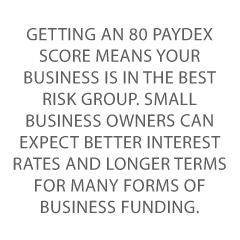What is a Good D&B PAYDEX Score?
A good PAYDEX score with D&B is an 80 or better (the scale goes up to 100). This means a business has at least three positive payment experiences, and it has been paying its bills on time within the past year.
This score is only based upon on-time payments. All other positive ways a business can be run do not help a PAYDEX score if a company does not pay its bills on time.
Since more vendors will report a negative payment experience versus positive ones, a business can easily get a bad PAYDEX score if they are not careful.
How Long Does it Take to Get a 80 PAYDEX?
It can take about 30 days if you want a free DUNS number. A business can conceivably take one day to buy from three credit issuers which report to D&B.
It can take a few months for a credit card issuer to report to Dun & Bradstreet. In general, it’s about four months. Once they do, you will have a PAYDEX score.
If your business pays its bills on time from the beginning, then it should have an 80 PAYDEX from the start. But if you need to counter an earlier late payment, it can take months to repair your PAYDEX score.
How Can I Get 80 PAYDEX Fast?
If your business still needs a DUNS number, pay to get it faster. Speed up the process by concentrating on credit issuers reporting positive payments to Dun & Bradstreet. Help expedite matters by adding tradelines to your D&B report.
It will not help expedite matters if you buy a shelf corporation! Improving your FICO score, while a worthwhile goal, won’t help, either.
Credit issuers should report to Dun & Bradstreet within the quarter but, if they seem to be dragging their heels, you might get some help if you contact customer service for vendors.
Then, finally, Dun & Bradstreet will post your score.
Is a PAYDEX Score—80—the Holy Grail?
It might as well be. Many business credit card issuers and loan providers will want to see a minimum PAYDEX score 80 on your company credit. But what does it take to get such a high business credit score? And are there any ways to make the process go faster?
Is a PAYDEX Score of 80 Good?
Getting an 80 PAYDEX score means your business is in the best risk group. Small business owners can expect better interest rates and longer terms for many forms of business funding. A small business owner can also expect a wider range of options for funding.
A good PAYDEX score can mean lower insurance premiums as well. A good credit score may be the difference between a company getting new business… or not.
But unlike with your consumer credit score, a high credit utilization percentage will not affect your PAYDEX score. With your personal credit score, credit mix is part of the calculation. The age of your personal credit and recent inquiries all are part of personal credit. You can end up with bad credit if you apply for too many cards at once.
When a company can boast an 80 PAYDEX score, it means uneven cash flow (like with seasonal businesses), an owner with less than stellar credit, or a lack of collateral should not be an issue when a company applies for business credit and financing.
An 80 PAYDEX score helps a credit card issuer or lender because it measures payment history. They can see at a glance if a business pays its bills on time. And, therefore, if that company is a good risk to do business with. A good credit score does all that.
The Small Business Administration likes a good PAYDEX, too.
PAYDEX Score Range
A PAYDEX score is based on payments from the past year. Businesses in Dun & Bradstreet’s database receive a PAYDEX score of 0 – 100, so long as the business has a DUNS number and at least three payment experiences reporting to the business credit bureaus.
It is much less complex than your consumer FICO credit scores.
But many vendors do not report. At Credit Suite, we keep track of trade credit (and other forms of credit) providers. We look for suppliers which report, but also those with good customer service.
A good business credit score does our clients no good if they can’t use it with suppliers who treat them well.
According to Dun & Bradstreet, a PAYDEX score of 80 means prompt payment, whereas a score of 70 means paying within 15 days beyond terms. Scores of 50 or lower indicate 30 or more days past terms. The lower the number, the worse the credit history.
The absence of a PAYDEX score is even more of a red flag for credit issuers and lenders. A missing PAYDEX score means a corporation never started to build business credit.
Contrast with the DB Rating, an indication of creditworthiness, based on employee size or financials, and on information available like trade pay history. Even though they are from the same company, these business credit scores are different.
How is a PAYDEX Score Calculated?
Dun & Bradstreet’s scoring algorithms are proprietary in nature. However, we do know that a PAYDEX score is really just based upon how well a business has paid its bills within the past year. It’s less complicated than individual credit scores.
The DB PAYDEX score has a dollar weighting. Hence a bill for $10,000 will figure more heavily in Dun & Bradstreet’s calculations of your business credit scores than a $2,000 bill would.
Business owners looking to improve their PAYDEX scores are well advised to pay off their larger bills first—in this case, the $10,000 bill. This way, you can readily use dollar weighting to your advantage.
Factor 1 – A Good Payment History
Like with most forms of corporate credit, having few to no late payments will lead to a good business credit score. Prompt payments will make more of a difference than anything else.
Truly, it’s the only area that D&B cares about for this score. And, D&B isn’t the only business credit bureau which values paying history.
Experian’s Intelliscore Plus and business credit scores from FICO SBSS can also be positively impacted by paying your vendor credit and other bills on time. But only if a supplier or a small business loan provider or the like actually reports. Many do not.
Factor 2 – Dollar Weighting
PAYDEX, D&B’s main credit score, is dollar-weighted. That is, Dun & Bradstreet will give more weight in calculating a business credit score when the amount loaned or credit extended is higher.
Hence business might have two accounts, and one has a higher credit limit than the other. Any larger bills—and those are more likely to be on the higher limit account—will count more.
As a result, for a better PAYDEX score, it is in your best interest to pay off larger bills first. This is true whether they come from vendor credit from suppliers or unsecured business lines of credit.
Factor 3 – Trade References
While it is better if a credit card issuer or lender reports, all is not lost if one does not. You can still ask for a trade reference.
Trade references are the only subjective part of any business credit report. They can affect a credit score.
If you have a good history of on-time payments with vendors not on your credit report, consider asking them for a trade reference. The only way to manually add a trade reference is to use D&B’s Credit Builder.
Pursuant to a recent FTC order, Dun & Bradstreet is improving the process of adding tradelines.
How to Improve your PAYDEX Score
A PAYDEX credit score 80 is possible if a business has a DUN number, three or more reporting payment experiences, and has paid its bills on time for the past year. Here’s an informal 80 PAYDEX program.
Firstly, a business must have a DUNS number, or any PAYDEX score is a nonstarter. DUNS numbers are free.
Secondly, a company must have at least three payment experiences reporting. Because so few vendors report, a business can have a stellar paying history but it wouldn’t affect their PAYDEX.
At Credit Suite, we are constantly checking credit issuers. Our up to date and thorough information helps keep your business from running down blind alleys.
Thirdly, those payments have to be reporting to D&B. It doesn’t hurt to be working with vendors which report to, say, Equifax instead—but that won’t improve your PAYDEX score unless those vendors also report to Dun & Bradstreet.
Fourthly, a business should monitor every credit report so it can easily see if scores are slipping or if incorrect information is dragging a PAYDEX down.
Finally, the PAYDEX score measures the prior year’s worth of payments. Newer businesses will have PAYDEX scores only based on whatever is available. More seasoned businesses can correct their PAYDEX once enough time elapses.
Takeaways
An 80 PAYDEX is within reach for any business. Get a DUNS number if you don’t already have one, get at least three positive payment experiences added to your D&B report, and keep paying your bills on time.
And, if money is tight, pay larger bills first, to leverage dollar weighting.
FAQs
What is a Good D&B PAYDEX Score?
A good PAYDEX score with D&B is an 80 or better (the scale goes up to 100). This means a business has at least three positive payment experiences, and it has been paying its bills on time within the past year.
This score is only based upon on-time payments. All other positive ways a business can be run do not help a PAYDEX score if a company does not pay its bills on time.
Since more vendors will report a negative payment experience versus positive ones, a business can easily get a bad PAYDEX score if they are not careful.
How Long Does it Take to Get a 80 PAYDEX?
It can take about 30 days if you want a free DUNS number. A business can conceivably take one day to buy from three credit issuers which report to D&B.
It can take a few months for a credit card issuer to report to Dun & Bradstreet. In general, it’s about four months. Once they do, you will have a PAYDEX score.
If your business pays its bills on time from the beginning, then it should have an 80 PAYDEX from the start. But if you need to counter an earlier late payment, it can take months to repair your PAYDEX score.
How Can I Get 80 PAYDEX Fast?
If your business still needs a DUNS number, pay to get it faster. Speed up the process by concentrating on credit issuers reporting positive payments to Dun & Bradstreet. Help expedite matters by adding tradelines to your D&B report.
It will not help expedite matters if you buy a shelf corporation! Improving your FICO score, while a worthwhile goal, won’t help, either.
Credit issuers should report to Dun & Bradstreet within the quarter but, if they seem to be dragging their heels, you might get some help if you contact customer service for vendors.
Then, finally, Dun & Bradstreet will post your score.

